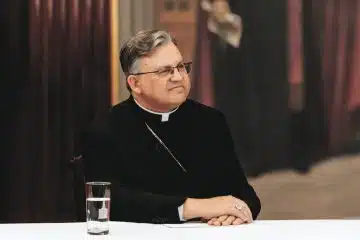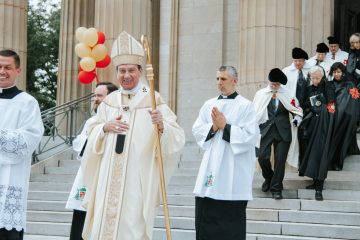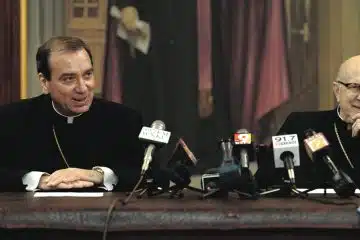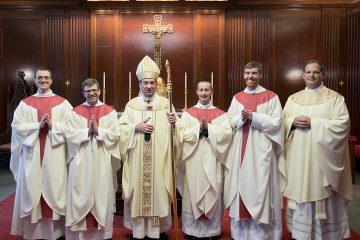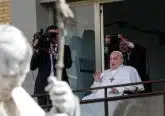The Synod on the Family: a look beyond the media hype
By Ann Schneible CNA/EWTN News
VATICAN CITY — As the media centers upon the question of whether the Church will change its teaching regarding reception of the Eucharist by those living in complex situations, there is a danger that many of the other, no less significant, issues may be falling to the wayside.
Duly titled “The Pastoral Challenges of the Family in the Context of Evangelization,” the aim of this extraordinary synod, set for Oct. 5-19, is to examine how to best proclaim the Gospel of the Family within the context of today’s diverse challenges and considerations.
While the topics on the expected agenda are varied – ranging from single motherhood, to the pastoral care of children of same-sex couples, to the challenge of promoting monogamy in cultures where polygamy is the norm – the majority of attention in Western media has been given to the debate over whether divorced and civilly remarried persons who have not received an annulment should, in select cases, be readmitted to the Sacraments.
However, the challenges facing the family today reach far beyond the issues which solely affect the families in the West, according to Fr. Thomas Rosica, English-language spokesman for the Synod on the Family. “The question of divorce and remarriage and access to the sacraments may be a burning issue in many countries of the west,” he told CNA on Oct. 1, yet “it is by no means the only issue that the universal Church is facing.”
Rather, many of the concerns being brought to the synod, he said, focus on the pastoral care of the family, for instance, in situations of extreme poverty, single parenthood, conflict and war, migration, and so on.
As the world looks to this Synod on the Family, Fr. Rosica explained, the central questions being asked pertain to how pastors, teachers, and ordinary faithful are “acknowledging what’s taking place,” examining how to begin teaching “the beauty of marriage, the importance of family life, the importance of bringing children into the world.”
“How do we look at so many people around the world who are broken and hurting and suffering because of failed relationships, because of war?” he said.
As one of the issues to be addressed during the synod, the pastoral care of divorced and civilly remarried persons is indeed serious and worthy of careful and compassionate attention. However, as was pointed out by Fr. José Granados, vice-president and professor of sacramental theology at Rome’s Pontifical John Paul II Institute for Studies on Marriage and Family, “the greater issue… is real renewal in the family ministry of the Church, that sees the family as the great resource of the Church for evangelization and for social action.”
Fr. Granados told CNA in an email interview that in Evangelii Gaudium, “Pope Francis has asked for a ‘pastoral conversion’ of the Church.” With this in mind, he said the focus of the synod should not be solely on problems, or “an attempt to ‘fix’ the family.” This is because the “the family is, above all, not a problem, but a great resource and a Gospel: resource for humanity, for living the common good, for taking care of the future, for a vision of faith.”
“The synod is called to understand the great gift God has given to us in the family and to foster this gift so that it becomes fruitful, with the measure of God’s fecundity,” he said.
Earlier this year, the Vatican released its “Instrumentum Laboris,” a document which lays out the pastoral concerns of today’s faithful. The reflections were based on responses to a series of questionnaires which were released late 2013 to dioceses around the world.
The document indexed a variety of issues faced by the family. Many of these are such as have been experienced by families in every generation, while others are localized to various cultures and regions of the world. Still others – such as those pertaining to same-sex couples, and the influence of social media on societal perceptions of the family – are wholly unprecedented.
However, the primary purpose of the synod, as stated in the Instrumentum Laboris, is to “reflect on the path to follow to communicate to everyone the truth about conjugal love and the family and respond to its many challenges (cf. EG, 66).”
Because the “family is the inexhaustible resource and font of life in the Church’s pastoral activity,” its primary task “is to proclaim the beauty of the vocation to love which holds great potential for society and the Church.”
Renewing “family ministry,” said Fr. Granados, entails the family becoming “not only object, but also subject of the new evangelization.”
“The family is not only something the Church needs to take care of, that the Church needs to fix,” he stressed. Rather, it “is a resource of human and Christian life, and each family is a subject for evangelization.”
Looking at the Synod on the Family from a pastoral perspective, Bishop Mark O’Toole, newly ordained bishop of Plymouth, U.K., told CNA on Sept. 19 that he hoped the gathering would give married men and women “the sense that this is really a path of holiness and a vocation, and that it’s possible to live a permanent loving relationship in marriage for life.”
“This is something which is tested very much in our contemporary world,” he said.
Recently in Rome for a conference on the “Pastoral Project of Evangelii Gaudium,” Bishop O’Toole spoke of the need for practical pastoral support for families: for instance, accommodating parents who come to the parish with their children, giving them space to feed their babies, etc. There is the need to ensure “that these things are looked at very concretely and very practically so that we can support families in coming together, and growing in their understanding and love of the Lord, their understanding and love of one another.”
“And, in this way, to be a sign in what is very often a broken world, and a world of broken relationships too,” he said.
“Positive pastoral initiatives,” he continued, should “try and help couples to prepare for marriages, to have a real sense that permanence is possible in love, because this in our society is questioned, to have a sense that there is great joy in living this life.”
Posted Oct. 5, 2014





